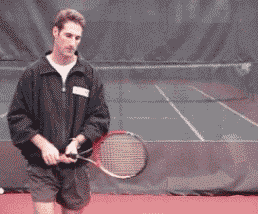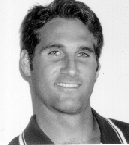|
Mental Toughness
Question: Jeff, why do so many players become frustrated and confused
about why they can play so well on one day and so badly on the next? What
have you found to be helpful for players to better understand this
situation? We need to get ourselves into a state of mind and body, together. Watch the pros– they are doing a lot of elaborate things before they go on the court. Besides keeping their mind in the moment, they are getting themselves organized. In fact, you’ll find that most good players are very organized. Their bag is organized. They have their racquets ready to go, their drinks, a change of shirt. By the time they walk onto the court, they are simply walking into this state, with the mind and body already working together. What can you do to build toward this state? You need to warm-up, you need to stretch. I like players to breathe, get themselves to focus “within” a little bit more, pull their mind in, so to speak, into a more narrow focus when they get on the court.
Question: For most people, errors are really frustrating. We see so much
emotion when players miss. This tendency to judge and criticize ourselves
appears to be a very real problem. What can we do to gain control of this
emotion? This whole notion of the critic - the voice within us that berates us and judges us - well, we need to deal with this in some way. I have a client who, at my suggestion, put a name to his critic. He called him "Fred." Try this next time your own critic surfaces. Picture your Fred knocking on your door. You go to the door, open it and say "Hi, Fred," and invite him in. So Fred just walks in, goes to your fridge, grabs something to drink, kicks back in the living room, puts his feet up and basically owns you. You are his victim. But you needn't be. What I
find to be really helpful is to smile when you recognize Fred, when you
hear his voice. Just smile. Because what does that do? It relaxes you
physically, sends a chemical to your brain that works for you. On one
hand, you are acknowledging the critic, not trying to deny him and shut
him out. On the other hand, you are neutralizing him, silencing this inner
critic.
Some people need a certain tension, what I call the tension of winning. A good dose of it can be helpful, but there is a threshold that all players need to discover for themselves. Go beyond that threshold and they'll begin to miss shots they might normally make. That’s why, in practice, players often play better than in a match that counts, because they are simply more relaxed. What I like players to do is to keep their attention very much on the ball during play, and when the point is over, focus first on their breath. They may choose to focus on a simple strategic adjustment if necessary. Sometimes they need to go to what I call the “mountain top,” expand their focus and remember, always, that this is just a tennis match, and ask themselves: “Why am I getting so worked up over this?” The bottom line is that a
player's focus shifts back and forth, depending on what is needed at the
time. Find your own points of focus, especially if you are an
over-thinker. Maybe you look at the trees outside the court to relax
yourself. Like a camera, you move from the close-up to the wide-angle
lens, and back again. The key point is that focus shifts during a match
and nerves are usually only a problem if we interpret them as a problem. A
broader perspective in the moment and ability to use this nervous energy
can make all the difference between a “good” or “bad” day.
Jeff: This is probably the most difficult area for players. For example, when we’re not playing well and missing a forehand we know we can execute, it can be frustrating. Sometimes we don’t really know why we missed it. Often, to manage this frustration, I have found that we focus too much; try too hard. We force our shots, we control more, and begin to over-think our technique. This is a pattern many players get into. What I’m saying is, back-up, take a deep breath, go to the back fence, decide to let go, give yourself room to miss. Allow yourself the opportunity to hit out and even miss some shots, with a sense of freedom. We need to take the handcuffs off. If we miss, I’m not saying "relax and let go" only if it creates the result we want. No, we’re investing in this philosophy and saying: "I’m just going to loosen up a bit and hit out within my range of ability because this feels better." On the other hand, depending on what kind of errors we are making, sometimes we may want to focus specifically on putting a few balls in play, especially if we are making errors by going for winners too early. In this case, we may want to get our rhythm back until our confidence returns.
Question: How much should players be thinking on the court? And does this differ depending on the level of the player? Jeff: Keeping it simple on the court is the most helpful approach for players no matter what their level. Many players, as I said, are often controlling their shots too much and are over-thinking. This creates a judgment mind-set. When we’re making errors, we need to be very specific in regard to our adjustments. For example, if we miss a backhand and don’t really know why, random tips won’t help us. If we know exactly what we are doing wrong, it can be useful to have an image in our mind, a swing thought. What I do on my return, for example, is that occasionally I take too big of a backswing. When I’m returning a 115-120 mile-an-hour serve, a big backswing is not helpful, obviously. So what I do is shorten it up and I keep this image very vivid for me before I return the serve—I am very specific. This one image really grounds me--short backswing and forward movement. So, if you have a helpful "swing" thought like this, use it. But a lot of players don’t really know what just happened. The truth is it could be a variety of things-- footwork, racquet head, racquet face; they could be pulling up on their shot. So, the point is– get this technique grooved in lessons, train the muscle memory. But on the court, in the match, we need to keep it very simple and trust our shots more, allowing ourselves to make adjustments as we go without over thinking. This area of trust is the biggest area I think that players can improve upon--if they become more aware of their body while they play, they will often begin to make the right adjustments automatically. I believe that when players miss a particular shot, and the ball is too far away from them, for example, they will know it and feel it if they stay present within their body and not consumed with analyses in their head. Sometimes I ask players, when I’m working on their mental game on the court if they miss, "What did you notice on that shot?" “Oh, I don’t know”, they’ll say. But when they stop and take a moment and really tap into the feeling in their body, most of the time they do know. “Oh, it was too far away”, I think. Usually, they are right. The above excerpt was taken from Mr. Greenwald's just released CD audio program, Fearless Tennis, the 5 Mental Keys To Unlocking Your Potential.
TennisONE is an informational and instructional Website. Your feedback is important to us. Let us know what you think and what you’ve learned by emailing us here at TennisONE.
This year's #1 world and U.S. ranked 35 singles player and Sports Psychology Consultant, Jeff Greenwald, Releases 2 Hour, Double-CD, Audio Program, FearlessTennis: The 5 Mental Keys to Unlocking Your Potential. Trained Sports Psychology Consultant, Jeff shares with all of us in this exciting, new audio program how he transformed his game through a change in his mind-set on the court and how we can do the same. Jeff Greenwald was very modestly ranked on the ATP computer in the early 90's. Ten years later, though playing only occasional tennis in the interim, has applied a Fearless mind-set to the game earning in 2001-2002 the #1 world ranking (ITF) in Men's 35s, and #1 (USTA) in both U.S. Singles and Doubles. At the Sybase and Siebel Open (half a million dollar ATP events), over the last two years, in San Jose, California, this same mind-set helped push two players to three sets, both of whom were in the second and third rounds of Wimbledon this year. Jeff is clearly playing better tennis now than he did when he was fulltime on the tour. How did this transformation happen? That's what you will find out in FearlessTennis, a two-hour audio program chock full of stories, interviews, practical techniques, and anecdotes from top-ranked pros-a program you can pop in the car on the way to a tournament. FearlessTennis
|
To contact us, please email to: webmaster@tennisone.com TennisONE is a registered trademark of TennisONE and SportsWeb ONE; Copyright 1995. All rights reserved. |
||||||||||||




